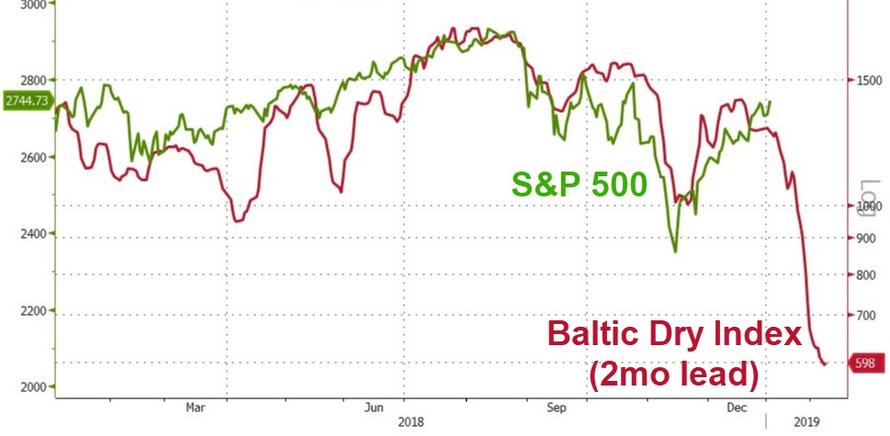Investors are not only worried about the effects of the U.S. – China trade war on global trade, they are also concerned it is weighing on global economic growth. What can shipping statistics tell us about where the economy is heading? What effect would a slowing economy have on equities. This article answers those questions and more. Read on.
By Lorimer Wilson, editor of munKNEE.com – Your Key To Making Money!
What Is the Baltic Dry Index?
The Baltic Dry Index (BDI):
- measures shipping rates on a type of cargo ship which hauls “dry” cargo, such as iron ore, coal, etc. as opposed to tankers hauling oil, or container ships hauling big steel boxes of stuff.
- represents the cost of renting an ocean-going container ship to move goods from, say, Chinese factories to the Port of Los Angeles. The more stuff being made and sold, the higher the demand for such ships, and thus the higher the price to rent one – and vice versa.

- An increasing BDI might suggest that a “risk on” attitude is appropriate when trading. That can mean having a bias toward being overweight/long equities and underweight safe developed market government bonds.
- A decreasing BDI could suggest a deceleration in global economic activity, favoring an underweight position in equities and overweight developed market sovereign bonds.
- Volatility in shipping rates (and, thus, the BDI) is due to near term supply of ships versus demand for commodities. Its just a matter of bottleneck problems. If rates go up it can come from either of two things:
- not enough ships at the time
- or too much commodities demand at the time. In a situation where ship owners match demand, which over the long run they will, then rates won’t sky rocket and will just track their costs plus some margin for their effort.
Why Is the BDI Such A Good Leading Indicator?
- The index looks at raw materials, so it captures activity at the very beginning of the production process.
- The index looks at ocean shipping, so it reveals what’s happening to international trade — the critical driver of global growth.
- The index indicates whether credit is tight or loose given the shipping business heavy dependence on credit.
Why Is the Baltic Dry Index Important?
The BDI is:
- an important leading economic indicator, because if steel companies are going to slow down their production of steel, for example, then they are likely to slow down their shipping of the ores they need to make the steel.
S&P GSCI Commodity Index

West Texas Intermediate Crude Oil

Copper

- a leading indicator for the stock market as its movements tend to show up about 25 trading days later in the movements of the SP500.
 After rising to robust levels in mid-2018 the Baltic Dry Index collapsed in January/February (see chart above) mostly due to the collapse of a dam at an iron ore mine in Brazil, which sent a shock through the shipping market because of the sudden cutoff in the shipping of that mine’s ore.
After rising to robust levels in mid-2018 the Baltic Dry Index collapsed in January/February (see chart above) mostly due to the collapse of a dam at an iron ore mine in Brazil, which sent a shock through the shipping market because of the sudden cutoff in the shipping of that mine’s ore.
A wildcard event like the mine collapse would not necessarily have to be echoed in the movements of stock prices so it is understandable that the S&P 500 did not have a big dip (see chart below) to echo the BDI’s drop earlier this year.

 munKNEE.com Your Key to Making Money
munKNEE.com Your Key to Making Money